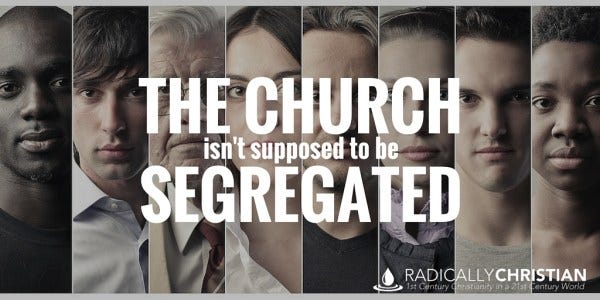The Church Isn’t Supposed to be Segregated
I’m just going to say it flat out, the Lord’s church should NOT be segregated. The church isn’t supposed to be segregated by skin color, age, economics, or anything else. But far too often we choose to segregate ourselves into separate congregations and even into separate and distinct groups within the same congregation. Here are a few thoughts on resolving the problem of segregation in the church.

What the Church is Supposed to Be
The church is made up of all those who belong to Jesus Christ. Therefore, a local congregation of the church ought to be made up of all those who belong to Jesus Christ who live in that vicinity. Congregations ought to be as diverse as the communities in which they are located. There is absolutely no biblical reason for a diverse community to have a congregation that is made up of just older people, just younger people, just white people, just black people, just poor people, or just rich people.
Furthermore, there is no biblical reason that within a congregation Christians should always be segregated into groups: singles, young marrieds, college-age, 50+, teens, recovering addicts, etc. There can certainly be benefits to occasionally breaking up into groups such as these, as people are at different stages of life, but too much of this can be detrimental to the very fabric of the church.
Jesus came to tear down walls of separation (Ephesians 2:14). He came to make us into one family, in which “there is neither Jew nor Greek, there is neither slave nor free, there is no male and female” (Galatians 3:28). The apostle Paul spent most of his ministry trying to bring people together, in spite of their racial and cultural differences. He chastised separating from one another (Galatians 2:11-14). He told older Christians and younger Christians to teach each other and learn from each other (Titus 2:1-8; 1 Timothy 4:12).
God’s design for the church is about togetherness, not segregation.
It’s About Identity
As I see it, one of our biggest problems is personal identity. Too often, our identity is all wrapped up in carnal matters. Our identity is wrapped up in our age, our hobbies, our profession, our race, our nationality, or maybe even our experiences. Because our identity is wrapped up in these carnal things, we identify primarily with others who share that identity.
When we make a big deal about identifying as a millennial, we naturally identify with others “in our group.” Those who do not share our identity are not necessarily our enemies, we just don’t consider them “one of us.” How we identify ourselves, therefore, is of the great importance. Do you primarily identify yourself as a black person, a white person, a baby-boomer, a Dallas Cowboys fan, an outdoorsman, or what? What is your identity?
As Christians, our primary identity should come from being “in Christ.” Peter wrote:
But you are a chosen race, a royal priesthood, a holy nation, a people for his own possession, that you may proclaim the excellencies of him who called you out of darkness into his marvelous light.
Do you see that? Your race is “Christian.” Your nationality is “Christian.” Your people are “Christians.” When we learn to see things this way, when we learn to identify primarily as someone who is “in Christ,” then we will see others who are in Christ as being our people, our group.
As Paul wrote, “From now on, therefore, we regard no one according to the flesh” (2 Corinthians 5:16). It’s all about being “in Christ.” It’s all about being “a new creation.”
The more we focus on the spiritual, the less the physical will matter.
Take Responsibility
Our tendency at this point is to acknowledge the problem but blame the people in the other groups. Older people say, “You’re right, but young people these days just don’t want to have anything to do with older folks like me.” While the younger people say, “Older Christians think poorly of my generation and they don’t want to build relationships with us.” And groups of Christians with different skin colors say, “It’s not us, it’s them.”
It’s time we stop the finger pointing and it’s time each of us takes responsibility for ourselves. It’s time we get out of our comfort zones, in order to get to know our brothers and sisters in Christ; regardless of their age, their socioeconomic background, their skin color, their hobbies, or anything else that might make them different from us. It’s time we take the initiative to help make the church what the church is supposed to be.
I realize it can be hard, when lines of segregation have already been drawn, to make changes; but if we are all willing to make small steps in the right direction, we can make a difference over time. You could start today by:
inviting someone over to your home for dinner who isn’t “in your group.”
sitting on a different pew in the worship assembly.
attending a different Bible class.
if you’re looking for a new congregation, you could even consider helping a congregation be less segregated; who cares if there are very few people your age, with your skin color, or at your economic level?
“From now on, therefore, we regard no one according to the flesh” (2 Corinthians 5:16).
I love you and God loves you,
Wes McAdams
The post The Church Isn’t Supposed to be Segregated appeared first on Radically Christian.




